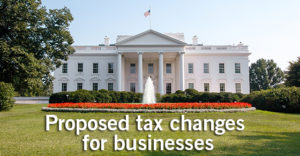
The election of Donald Trump as President of the United States could result in major tax law changes in 2017. Proposed changes spelled out in Trump’s tax reform plan released earlier this year that would affect businesses include:
- Reducing the top corporate income tax rate from 35% to 15%,
- Abolishing the corporate alternative minimum tax,
- Allowing owners of flow-through entities to pay tax on business income at the proposed 15% corporate rate rather than their own individual income tax rate, although there seems to be ambiguity on the specifics of how this provision would work,
- Eliminating the Section 199 deduction, also commonly referred to as the manufacturers’ deduction or the domestic production activities deduction, as well as most other business breaks — but, notably, not the research credit,
- Allowing U.S. companies engaged in manufacturing to choose the full expensing of capital investment or the deductibility of interest paid, and
- Enacting a deemed repatriation of currently deferred foreign profits at a 10% tax rate.
President-elect Trump’s tax plan is somewhat different from the House Republicans’ plan. With Republicans retaining control of both chambers of Congress, some sort of overhaul of the U.S. tax code is likely. That said, Republicans didn’t reach the 60 Senate members necessary to become filibuster-proof, which means they may need to compromise on some issues in order to get their legislation through the Senate.
So there’s still uncertainty as to which specific tax changes will ultimately make it into legislation and be signed into law.
It may make sense to accelerate deductible expenses into 2016 that might not be deductible in 2017 and to defer income to 2017, when it might be subject to a lower tax rate. But there is some risk to these strategies, given the uncertainty as to exactly what tax law changes will be enacted. Plus no single strategy is right for every business. Please contact us to develop the best year-end strategy for your business.
© 2016



